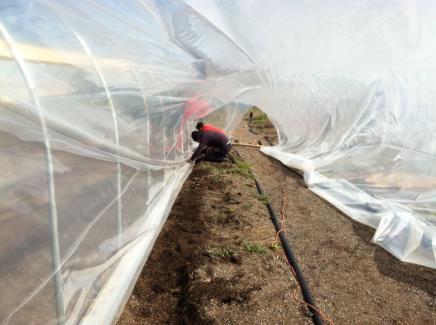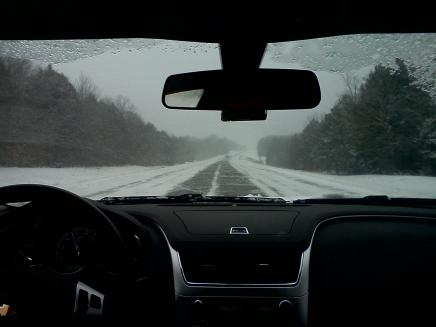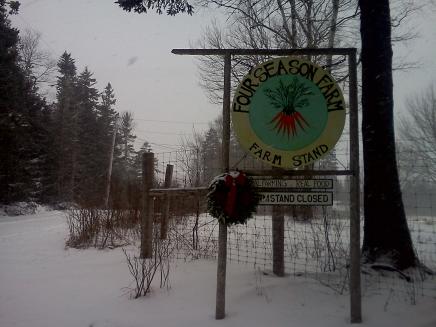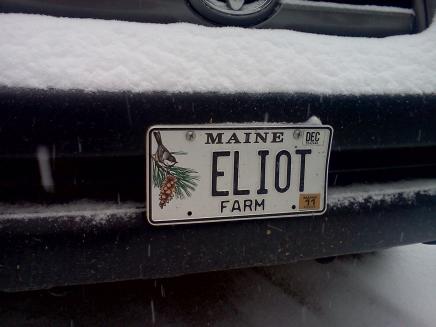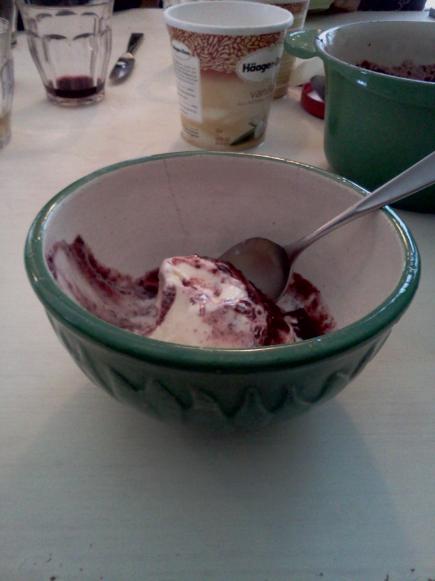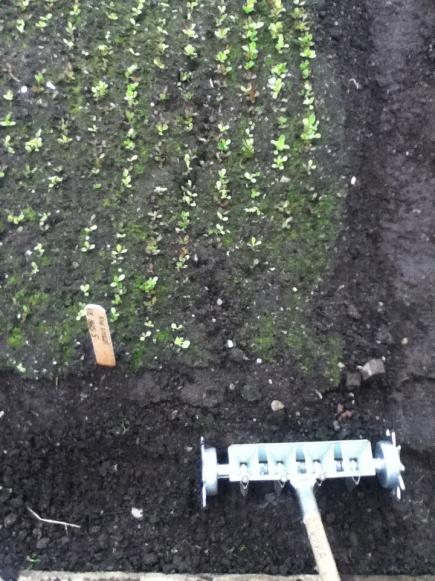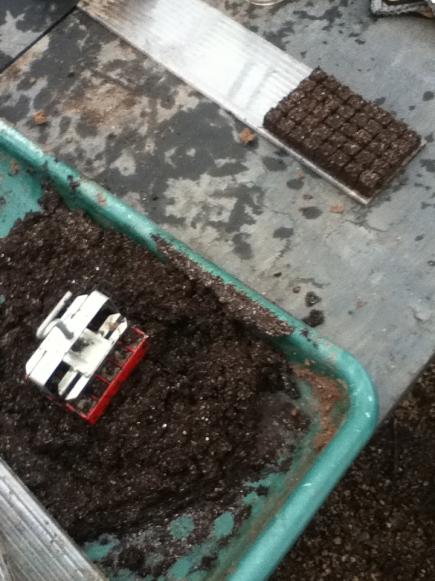Like for Meg, there’s lots of hustle going on over my side of the fence. Work at the farm I manage, Brooklyn Grange, is ramping up pretty quickly as the season approaches. Which means finishing up the hoophouse, starting and nuturing seedlings, finishing up crop plans and maps, organizing interviews for summer season interns… and we haven’t even started tilling. But, it’s the best kind of hustle in the world. I ain’t complainin’.
Speaking of the hoophouse, here we are applying the skin… a gnarly (seriously) process involving a thin, delicate plastic sheet, a large metal and wood frame with lots of pokey edges and corners, and this ingenious but also devilish stuff called wiggle wire. Don’t ask:
Anywho, I somehow managed to make a quick farm field trip last week to Maine. It was an experience I’ll never forget.
Clara Coleman, a great CO-based farmer and daughter of extended-season (well, year-round) farming guru Eliot Coleman, invited Brooklyn Grange head farmer Ben, myself, and fellow farm friend Zach Pickens, up to visit her father’s Four Season Farm.
Visiting a farm in winter, in Maine, in a foot and a half of snow. What the what?
Eliot Coleman is a pioneer and authority on organic/natural/sustainable and winter farming. His books, The New Organic Grower, Four Season Farming, and The Winter Harvest Handbook have a cult following. And they deserve it.
We headed to the farm expecting to help him build one of his famous movable hoophouses in exchange for some wisdom and ideas to take home…
Instead, we got to the house, peeled off our coats and boots in the mudroom, and were invited into the dining room where Eliot’s wife Barbara Damroch (a master gardener in her own right, and amazing chef to boot) was cooking up a city-block-wide pork roast, which turned out to be from one of their own hogs. We ate more than our fair share of heritage pork, salad from their kitchen garden (also, under a hoophouse), and potatoes, and washed it all down with Eliot’s own homemade wine from grapevines he trellised along the back patio. The only thing not grown on grounds was the vanilla ice cream for desert, but it was topped off with Barbara’s homemade, homegrown grape conserve.
Full, warm and a little slow from the wine, we donned our snow gear and left for the main hoophouse, which doubles as growing space (he had lettuces, carrots, and spinach coming up) and workshop.
Eliot is a tinkerer and spends lots of time designing and redesigning tools to make farming easier and more efficient. He showed us a few of his toys: multi-row pinpoint seeder, his hand-welded flame weeder, and the ingenious tilther (a power-drill-powered tiller). I’d show you photos of everything, but since many are his own works of art, I’d feel bad about not letting him show you himself. Read his books, visit his farm, and look him up online. Luckily, Johnny’s sells the pinpoint seeder and soil-block maker, so sneak a peek:
We toured a few other hoophouses: seed starting, chickens, and crops. I could write for days about how amazing everything was – crops and livestock growing healthily and beautifully in unheated, carefully planned structures, with a minimum of work and a maximum of inventive tool creativity – but you have to see it to believe it.
Instead, I’ll share some wisdom gleaned over homemade wine…
Eliot was an outdoorsy adventurer kind of guy in his youth. He told us about a trip to El Capitan (at least I’m pretty sure that’s what it was) back in the day, which he and his friends managed to scale in something like 48 hours. At the time, he said, this was a pretty big feat.
But today, he said, good climbers are going it in around 4 hours.
Eliot said that he sees a similar phenomenon happening in farming, where by sharing insights, passing along wisdom, and tinkering and tinkering and tinkering, what we’re capable of will eventually exceed all of our best expectations. By building on the building that was done before us, we young farmers can only keep scaling El Capitan faster and more efficiently.
I like to think this about homesteading, too. We should continue to share our stories of creative problem solving and successes and failures, because it will only help us all become smarter and stronger. Let’s think of ourselves as the Farm Hack of homesteading and take our quest for sovereignty to the next level.
Here’s to building on building, fellow ‘steaders.
]]>

